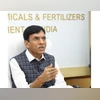Our current focus on primary health centres through Ayushman Bharat Health and Wellness Centres (AB-HWC) will help India become a model for other countries engaged in health sector reforms, Union Health Minister Mansukh Mandaviya said on Monday.
Addressing the 76th session of the World Health Organisation Regional Committee for South East Asia Region (WHO-SEARO), Mandaviya said that India is following a holistic and inclusive approach in alignment with the vision of Universal Health Coverage and the resolute commitment to 'leave no one behind'.
“As of 24 October 2023, AB-HWCs have recorded over 2,110 million footfalls. The impact is resounding with individuals availing free drugs over 1,830 million times and diagnostic services over 873 million times,” the minister said.
The minister added that 26 million wellness sessions have also been conducted in these HWCs, engaging more than 306 million people.
Speaking on the government’s programmes in the healthcare sector, Mandaviya said that initiatives such as Ayushman Bharat Digital Mission and PM-ABHIM have substantially strengthened the digital health framework and physical infrastructure. It is catalysing an evolution of healthcare delivery, resulting in positive health outcomes and reduction in out-of-pocket expenditures.
In his address, the minister noted the Government of India’s allocation of Rs 239.5 crore to facilitate the construction of the WHO SEARO building in New Delhi.
More From This Section
“This building stands as a symbol of the collaborative effort of India and WHO to address global challenges and ensure inclusive and equitable development of healthcare services in the South East Asian region,” he said.
SEARO is one of the six regional divisions of WHO, which includes 11 member states and accounts for a quarter of the world's population. The regional body's main objective is to address persisting and emerging epidemiological and demographic challenges.
The 76th SEARO session will include ministerial roundtables on accelerating prevention and control of cardiovascular diseases, ending neglected tropical diseases and regional health security. The regional committee is also scheduled to vote for the next WHO Regional Director for South East Asia.
)